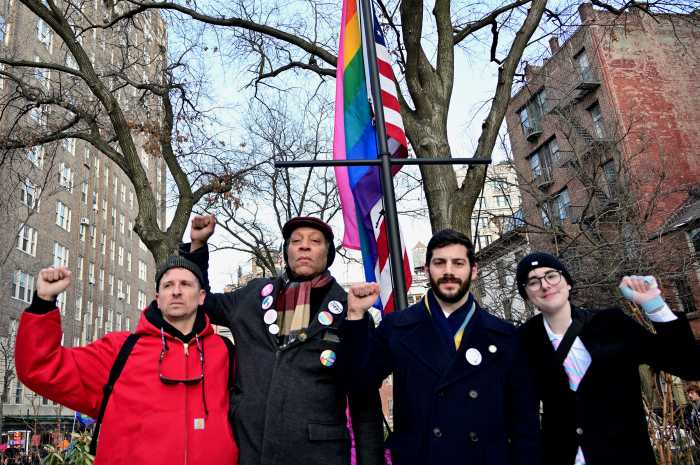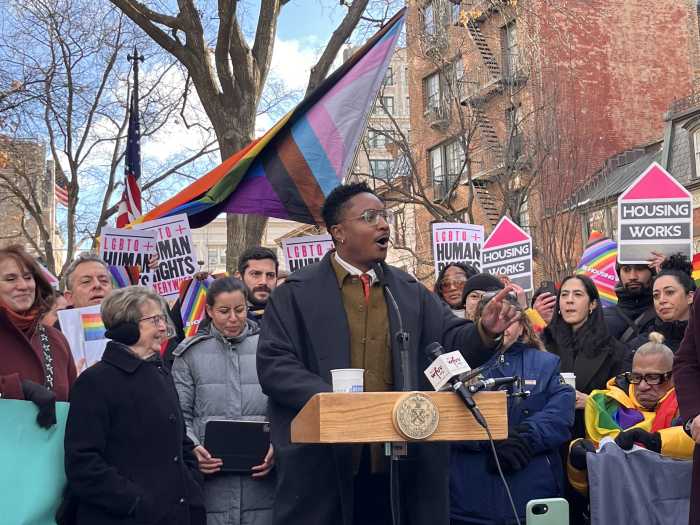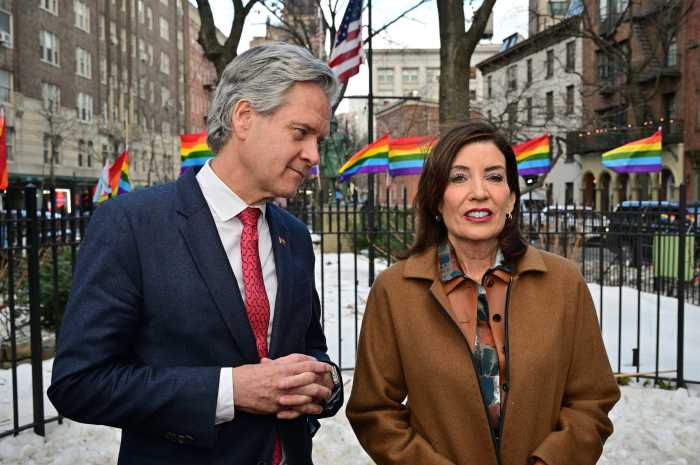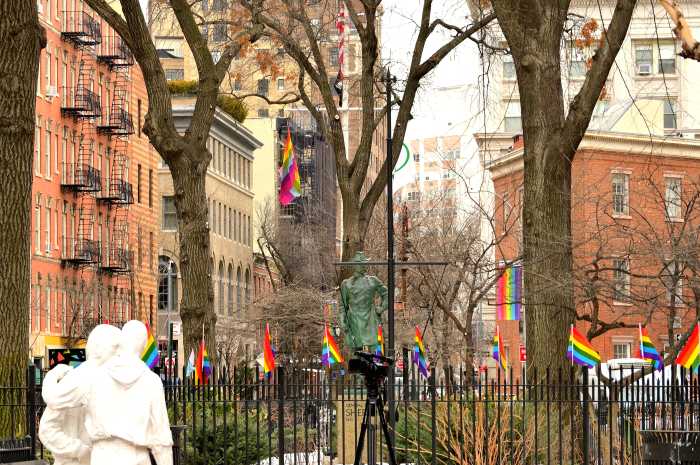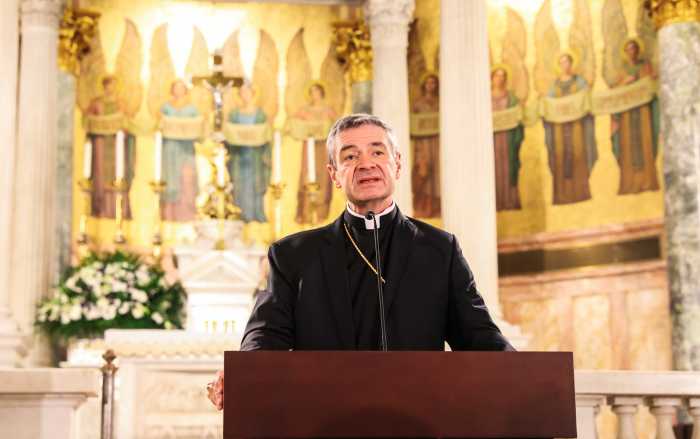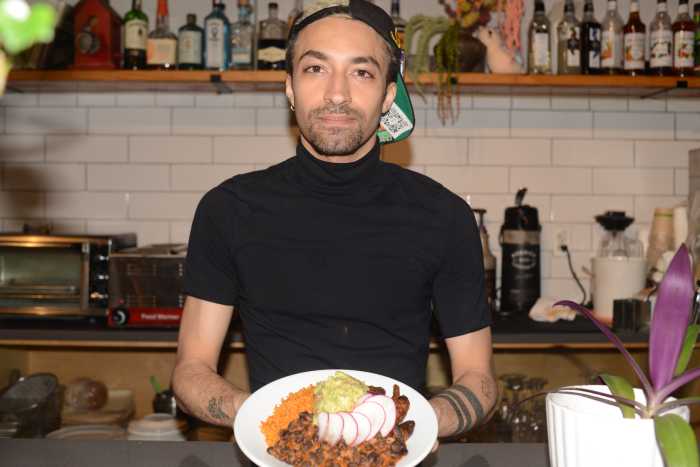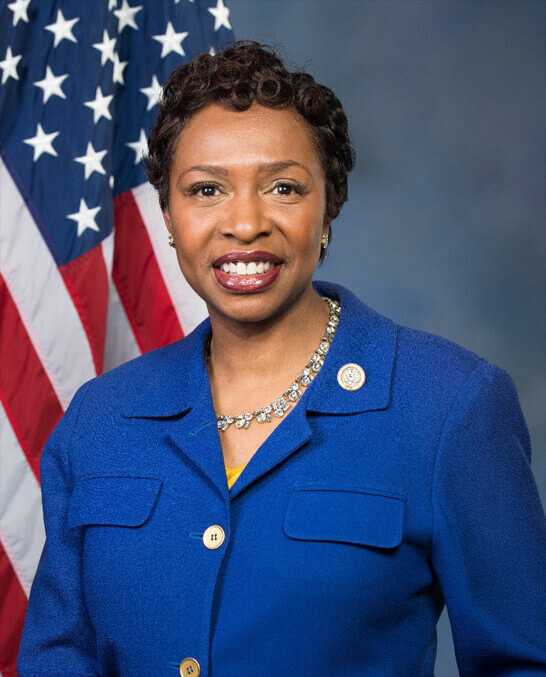BY ANDY HUMM | Lou Maletta, who brought gay and AIDS issues, entertainment, and erotica to cable television for 20 years — in New York and nationally — died of liver cancer on November 2. He was 74.
Long before “Ellen,” Logo, out gay news anchors, and the rise of the Internet, Maletta was reaching hundreds of thousands of LGBT people hungry for representations of themselves and news about the burgeoning movement.
Gay Cable Network founder put sex, politics on the tube
In 1981 in upstate Woodstock, Maletta started the Gay Cable Network (GCN) with “Men & Films,” a show that took advantage of the new freedom in cable TV to “put the male body back on the map,” as he said at the top of every show. While cable regulations forbade showing sexual penetration or any touching of genitalia, Maletta’s artful editing brought steamy male-to-male sex to a wide audience.
His interest in sex was keen, and he was famous for the sex parties that he ran out of his shifting headquarters over the years, but his vision was much larger. He soon used his professional-quality video and editing equipment to produce news and entertainment programs — from Slave Dave’s “In the Dungeon,” about S&M and bondage, to the news program “Pride and Progress” that eventually became the “Gay USA” show this reporter still co-hosts with Ann Northrop.
Maletta told Gay City News in 2009 that what motivated him to expand his programming was watching a 30-year-old friend “turning into someone who looked 90 six months after being diagnosed with GRID [Gay-Related Immune Deficiency, the first acronym for AIDS] in 1982. No one had seen a KS lesion on TV until we put it on cable.”
Maletta’s “Gay Week in Review” was sponsored by the Human Rights Campaign. The Gay and Lesbian Alliance Against Defamation did a weekly “Naming Names” segment, targeting those who engaged in defamation of gay people. (When Bob Hope told an anti-gay joke, he made amends by taping a public service announcement condemning anti-gay bigotry that frequently ran on GCN.) Maletta covered arts and entertainment in a show called “Be My Guest,” on which celebrities from Harvey Fierstein to Derek Jarman to Patrick Stewart appeared and Quentin Crisp famously interviewed Divine. He made performers such as Sybil Bruncheon (John Burke) famous, in part through a panel show modeled on “What’s My Line?” And there were sports correspondents from “Gutter” George to Bill Balmer to Lee Sharmat, who also co-hosted news programming.
At a time when the New York Times would not use the word “gay” and most mainstream outlets gave scant coverage to LGBT news or culture, Maletta and his crews were ubiquitous at LGBT events, not just delivering their reports to viewers of Manhattan Cable channel 35, but also shipping out tapes for weekly showings in 20 cities from San Francisco to Cincinnati to Atlanta.
These were not the first gay-themed cable TV shows — “Emerald City” on channel J in Manhattan had that distinction — but Maletta’s 20-year run of original programming demonstrated enormous staying power in an adverse commercial and social climate for gay content. His shows coincided with the emergence of the AIDS epidemic and provided virtually the only television coverage the crisis got at that time. The new Gay Men’s Health Crisis did a weekly AIDS report with Federico Gonzalez, and eventually the New York City Department of Health’s Office of Gay and Lesbian Health did a segment called “Lavender Health” hosted by Ron Vachon, Ellen Zaltsberg, and Frank Oldham, among others.
Perhaps the most ambitious of Maletta’s projects was his coverage of the Democratic and Republican National Conventions from 1984 to 2000. Using teams of volunteer reporters, including knowledgeable leaders such as Vivian Shapiro and Philip Reed, he secured press floor passes so that politicians from Senators Strom Thurmond and Bob Dole to Governors Ann Richards and Jerry Brown could be put on the spot on LGBT and AIDS issues. During AIDS’ darkest days in 1988, Maletta’s crews went to New Orleans for the Republicans and Atlanta for the Democrats, were put up by local activists, and covered not just the politics inside the halls but the intense ACT UP demonstrations in the streets, as well. Maletta bought satellite time so that one-hour programs could be beamed around the country every night. (Coming home from New Orleans through Mississippi, we stopped at a Hardees, and when Maletta walked in with his spandex outfit and a gay T-shirt, the place went deadly silent. I didn’t think we’d get out alive, but perhaps the locals were just too shocked to react.)
Northrop, since 1996 my co-host on “Gay USA” — which has continued on Manhattan Neighborhood Network and Free Speech TV since Maletta ceased programming in 2001 — said, “He had a tremendous vision and unlike most people, he acted on it and made it happen. Because he was such a rebel and way before his time, he didn’t reap the benefits, which could make him cranky and difficult. But he is a really important figure in our community.” Indeed, Maletta’s vision of a 24-hour gay network was mentioned in the mainstream media in 1991, but did not come to fruition until the here! and Logo networks emerged more than a decade later.
John Glines, the pioneering producer of gay theater who was the first Tony awardee to mention a gay partner in an acceptance speech when he won for “Torch Song Trilogy,” wrote, “I never saw Lou wear anything but black leather, but he was a real white hat. He was enormously supportive of every show I ever produced, for which I will always be grateful.”
Michael Rogers, the DC gay blogger and activist and subject of the documentary “Outrage,” wrote, “Lou was a real pioneer, one of the community’s unsung heroes who was breaking new ground decades ago. Lou helped begin a movement that has resulted in more pro-gay depictions in media and showed a community how to harness media for its own benefit.”
Louis P. Maletta was born in Bushwick, Brooklyn, on the December 14, 1936 and grew up in Ridgewood, Queens. He served in the Army and, before coming out, married a woman and had a daughter, with whom he remained close. His own mother died just three years ago.
Maletta videotaped his programs at first out of his apartment on West 15th Street, which he shared with Luke Valenti, his domestic partner of 37 years who survives him. The two also shared a cabin in the woods in upstate Saugerties, where Maletta died. Sybil Bruncheon wrote, “Lou said Luke made him laugh more than anyone on Earth and that it was the secret to a long marriage!”
Maletta later had studios in Manhattan buildings that doubled as sex clubs late at night. There was nothing quite like bringing a candidate for public office in for an interview with an erotic mural looking down at them from off-stage and lubricant residue still on the chairs. But no one walked out and many sought the chance to be on the shows, including Ed Koch and David Dinkins when they ran against each other for mayor in 1989.
One man who frequented his sex parties said, “There would be porn on one screen and Lou watching a documentary on the Renaissance on the other. He had an unbelievable breadth of knowledge and was as comfortable in chaps as at the opera.”
Bruncheon, who did numerous shows and club events with Maletta from 1984 until 1993, wrote, “He was an incredibly learned and sophisticated man under all the leather and paraphernalia — and he revealed his classiness only when it suited him.”
Gay journalist David France, producer and director of the upcoming AIDS documentary “How to Survive a Plague,” related this story: “Lou, returning from the Amsterdam International AIDS Conference in rubber shorts and a fish-net tank top, with knee-high leather boots, was asked by the man next to him if he didn’t feel uncomfortable traveling in such a get-up. ‘My boots are filled with marijuana,’ he said, ‘and nobody would DARE frisk me, dressed like this.’”
Mark Berridge, who now produces movie trailers, got his start in TV at Gay Cable Network in 1994. “He really walked the talk,” he said, “and he was totally unapologetic about who he was.”
John Ryan, creator of “The 10% Show” that ran in Chicago from 1989 until1992, wrote that he based his show on Maletta’s after being invited to spend the weekend with him up in Saugerties in 1987.
Alex Grafov, one of Maletta’s close friends for the last ten years, said “Lou’s philosophy was, ‘I want to make money and I want to have fun.’” The money part may not have worked out as it should have, but he never stopped enjoying life.
Michael Weyand, who was the Best Boy on Maletta’s shows, worked a Pride March with him and Luke in 1984 when “he spotted a little old lady on the sidewalk with a sign, ‘Grandma for Gays.’ Lou put her on the show and the following year she was atop of limo in the March,” an example of “how even then –– on public access –– how much influence Lou had.”
Eric Evans was with GCN from 1985-1990 “covering everything from the conventions to the premiers of Falcons 100 film to the AIDS quilt,” he wrote. “Lou taught me to be proud of myself with no regrets or apologies.”
At Maletta’s wake, Robert Parker, another GCN veteran, called him “a second father” and praised the way he fearlessly confronted elected officials about what they were doing about AIDS.
Luke Valenti, the love of Lou’s life, said Maletta’s goal was “to foster a sense of brotherhood in the gay community, working together to make progress. He was very patient in an age where there is no patience.”
Maletta’s vast Gay Cable Network archives were acquired in 2009 by NYU’s Fales Library in a deal brokered by Allen Zwickler, brother of the late filmmaker Phil Zwickler who was a frequent correspondent for GCN before his death in 1991. “It’s more than 6,000 hours of film about civil rights and human rights,” Zwickler told Gay City News then. “It is so incredible that it had to be preserved.”

